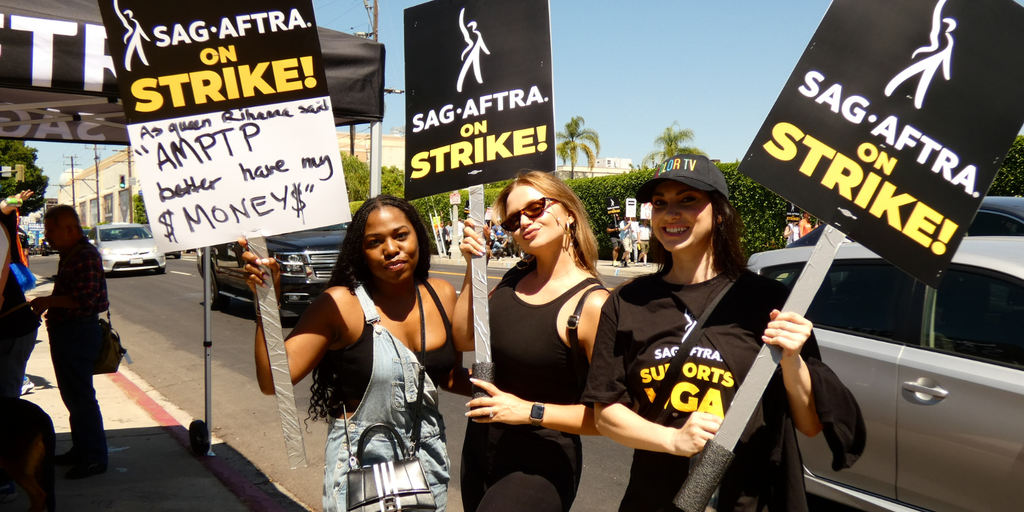### Summary
The New York Film and Television Union Coalition, consisting of several unions including SAG-AFTRA and WGA, supports bills in New York that would prohibit the use of artificial intelligence (AI) to displace workers in film and television productions.
### Facts
- The Coalition praises two identical bills in New York State that aim to prevent companies from using AI to replace human workers in film and TV productions.
- The coalition is formed by SAG-AGTRA, WGA East, Directors Guild of America, Cinematographers Guild (IATSE Local 600), Editors Guild (IATSE Local 700), United Scenic Artists (IATSE Local 829), IATSE Local 52, and Teamsters Local 817.
- The use of AI in film and TV production is a significant issue for WGA and SAG-AFTRA, who are currently on strike.
- The DGA's recently ratified contract includes precautions regarding the use of AI, while IATSE is preparing for contract negotiations next year, concerned about the potential disruption of AI in the industry.
- The Union Coalition supports the pending legislation in order to prioritize worker protection and avoid job displacement.
- While acknowledging the potential benefits of AI, the Union Coalition emphasizes the importance of human creativity and vows to protect workers and their contributions to the arts.
- The DGA's AI provisions in their contract include ensuring that the duties of DGA-represented employees are assigned to them rather than AI, and the need for consultation with DGA-covered employees regarding the use of AI in creative elements.
👏 Union Coalition praises bills in New York to prevent AI job displacement in film and TV.
🌟 Several prominent unions, including SAG-AFTRA and WGA, support the legislation.
🔒 AI use in production is a key strike issue for WGA and SAG-AFTRA.
🤝 DGA's contract includes safeguards for AI use, while IATSE prepares for negotiations and expresses concerns.
The Alliance of Motion Picture and Television Producers (AMPTP) has released a comprehensive package to address the concerns of the Writers Guild, including higher compensation, increased data transparency, and protections for writers in the areas of artificial intelligence and minimum staffing. The proposal represents the highest wage increase for writers in 35 years.
The Writers Guild rejects the latest counteroffer from the Alliance of Motion Picture and Television Producers (AMPTP) for a new contract, stating that it does not fully address their demands, including regulations on artificial intelligence and better protections for writing teams.
The Hollywood studios have made their offer to the Writers Guild of America (WGA) in hopes of ending the ongoing strike, including a wage increase and protections against artificial intelligence, although a deal has not yet been reached.
The ongoing strikes by the Writers Guild of America (WGA) and Screen Actors Guild (SAG) in Hollywood highlight the issue of unfair pay and working conditions for actors and writers, particularly in the streaming industry, and call for change in the industry to treat its workers fairly.
Negotiations between the Writers Guild of America and major film and television studios could lead to a deal as early as Sunday, potentially ending the nearly five-month-long strike by the union.
US screenwriters may end their five-month strike after reaching a tentative deal with studio bosses, which still needs approval from Writers Guild of America (WGA) members.
The Writers Guild of America (WGA) has reached a preliminary labor agreement with major studios, ending one of the two strikes that have halted film and television production, costing the California economy billions; however, the SAG-AFTRA actors' union strike continues.
Hollywood writers and studios have reached a tentative agreement to end the strike that has halted most productions since May, pending ratification by the Writers Guild of America.
The Writers Guild of America has reached a tentative deal with Hollywood studios after a five-month strike, with key points including limits on the use of artificial intelligence (AI), allowing writers to use AI with permission but not mandating its use, and preventing studios from using AI-generated material without informing the writers; however, concerns remain as SAG-AFTRA, the labor union representing actors, is still on strike and has raised worries about the impact of AI on their industry.
The newly proposed WGA basic agreement protects Hollywood writers by specifying that AI-generated writing cannot be considered "literary material" and that writers must be credited and compensated for any use of AI in their work. The agreement also includes regular meetings to review the use of AI in film and TV production.
The 148-day-long Writers Guild of America strike is over, with screenwriters winning a new WGA contract that raises standards and establishes enforceable rules for the use of AI.
The Writers Guild of America has ratified a new contract with major production studios, bringing an official end to the months-long labor dispute that disrupted the entertainment industry and halted the production of films and television shows.
The Alliance of Motion Picture and Television Producers (AMPTP) has walked away from contract negotiations with the Screen Actors Guild - American Federation of Television and Radio Artists (SAG-AFTRA) due to differences on compensation based on viewership figures, leaving the talks at a standstill.
